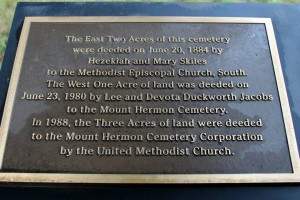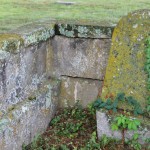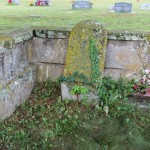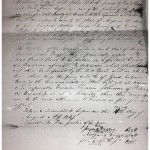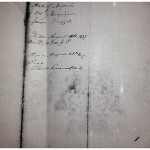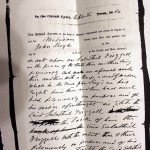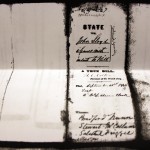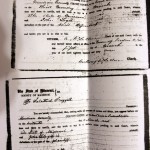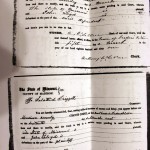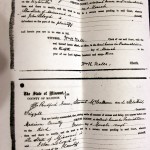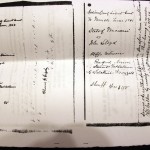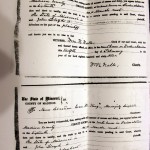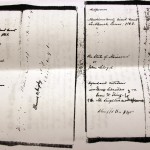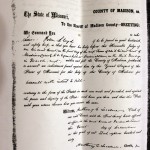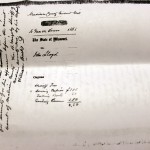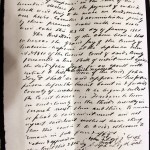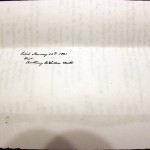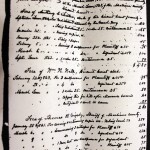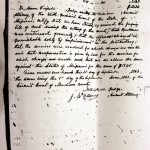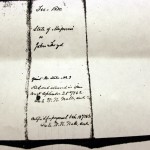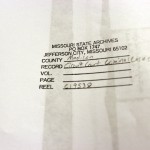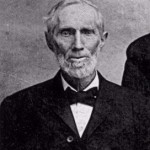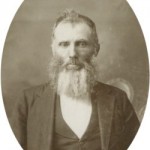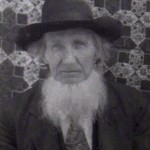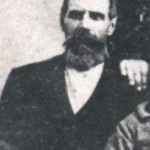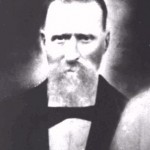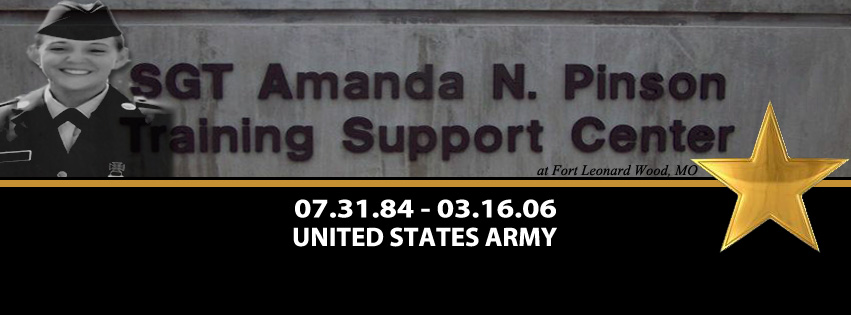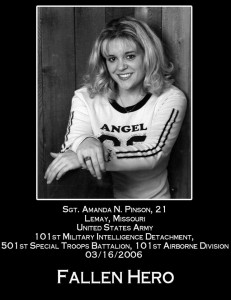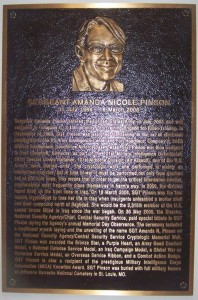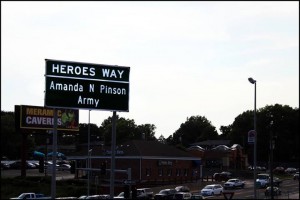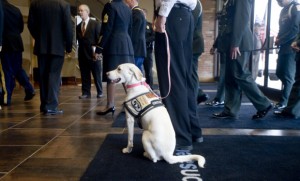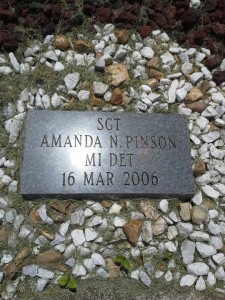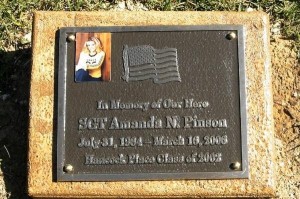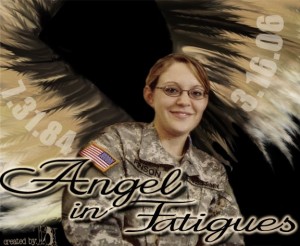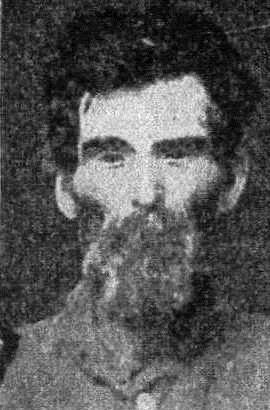 Henry F Frizzell married Rebecca St. Clair
Henry F Frizzell married Rebecca St. Clair
Birth: Dec 1839 in Missouri, United States
Source:
Death: 25 May 1904 in St Louis, St Louis, Missouri, United States
Buried: See notes below
Source: Click here
Henry & Rebecca St. Clair were married in 1869 Madison Co., MO, USA
Source: (will get digital proof listed soon)
Spouse #1: Rebecca St. Clair
Birth 17 Jan 1849 in Madison, Missouri, United States
Death Jan 1888 in Madison, Missouri, United States
Henry & Sarah (nee Carmack) Bradshaw were married 11 Oct 1893 Madison Co., MO, USA
Source: Click here
Spouse #2: Sarah Bradshaw
Birth 5 Jun 1850 in Madison, Missouri, United States
Death 16 Feb 1924 in Fredericktown, Madison, Missouri, United States
MY HENRY F FRIZZELL CONNECTION
Children of Henry F Frizzell & Rebecca St. Clair: (my 4th Great Grandparents):
Margaret Mae “Maggie” Frizzell married John L. Sutton 6 Oct 1888 in Missouri
Birth Feb 1872 in Missouri, United States
Death 26 Nov 1934 in Iron, Iron, Missouri, United States
Children of Margaret May Frizzell and John L Sutton (my 3rd Great Grandparents):
Rachel D Sutton (married John Alexander Burnia 7 Feb 1910 in Fredericktown, Madison Co., Missouri)
Birth Jun 1894 in Spencer, Indiana, United States
Death 1967 in St Louis, St Louis, Missouri, United States
Children of Rachel D Sutton and John Alexander “Alex” Burnia (my 2nd Great Grandparents):
Alma May Burnia (married Bufford Lee Nickles, Sr. 23 Apr 1932 in Cadet, Washington Co., MO, USA (my Great Grandparents)
Birth 16 Feb 1916 in Missouri
Death 4 Feb 2011 in Bonne Terre, Saint Francois, Missouri, United States of America
Children of Alma May Burnia and Bufford Lee Nickles, Jr (my Great Grandparents):
Due to the fact that my Grandfather is still living I cannot post his name to further list the connection. From here I will respectively say that he is one of the 3 sons that Alma & Bufford, Sr. had. He is my maternal Grandfather (that meaning he is my Mother’s Father) and then there is me.
Note: To learn more about the Frizzell family lineage please see the page that I am working on as I further trace our family tree. Below you will find more information about Henry F. Frizzell posted. I hope that it assists you on discovering your roots.
PICTURES & NOTES
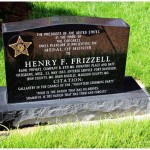
Front of Memorial
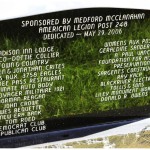
Back of memorial
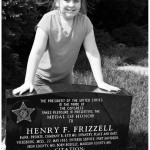
Henry’s Great Great Great Great Great Granddaughter
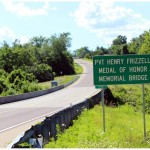
Memorial Bridge on Hwy 72W
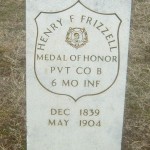
Headstone
ARTICLES
AN UNKNOWN HERO TO BE HONORED MONDAY —
MADISON COUNTY PAYS TRIBUTE TO CIVIL WAR MEDAL OF HONOR RECIPIENT – By SHERRY GREMINGER\Daily Journal Managing Editor
The DAILY JOURNAL, Friday, May 26, 2006FREDERICKTOWN – For more than 100 years, a hero lay buried in St. Louis unknown to his family and unknown to his community. Although a stone at Mount Lebanon Cemetery on St. Charles Rock Road marks his grave site, noone is really sure the remains of Henry Frizzell are there.Monday, this man who died a pauper in St. Louis in 1904 will be honored here as Madison County’s only recipient of the Congressional Medal of Honor.Finally his family and community will have the opportunity to pay respects to this Union soldier who labored so hard to get his military record cleared and to eke out a meager life for himself and his family in the years following the Civil War.Frizzell’s great-great-grandson Charles Dalton, of St. Louis, and his two uncles Michael Sutton of St. Louis and David Sutton of Cuba, Mo. will be in Fredericktown Memorial Day to honor their ancestor. Dalton said his son might also be there – representing yet another generation who will finally be able to pay tribute to their family’s war hero.The Medford McClanahan American Legion Post 248 will hold a dedication ceremony at 11 a.m. Monday on the south lawn of the Madison County Courthouse to dedicate a monument to Frizzell, as the county’s only Medal of Honor recipient.Dalton said Frizzell died of consumption May 25, 1904 at City Hospital and because he was a pauper he was buried in Potter’s Field. His remains have since been moved twice and now supposedly rest in Mount Lebanon Cemetery on St. Charles Rock Road. When the city sold the ground at Potter’s Field
in 1957, all remains were moved to Mount Lebanon Cemetery.“When they sent the remains to the cemetery, there were no names or markers to accompany them. All of the remains were put in one section of the cemetery. That land was also later sold and the remains were moved to Section F in the cemetery,” Dalton said.According to Dalton a marker was dedicated to his ancestor in 1991. The ceremony was sponsored by the Medal of Honor Historical Society and the Veterans Administration provided a headstone etched in gold. Dalton said it was placed at the front of the cemetery because no one was exactly sure
where his remains might be.When Frizzell was buried, there is no indication any of his family was present. One thing, however, is certain – those burying him did not know Frizzell, the man, or Frizzell, the hero.HENRY FRIZZELL – THE MAN —
The attack on Fort Sumter in 1861 coupled with the promise of pay and food to eat were enough to entice a 21-year-old farmer from Fredericktown to join the Union Army. Henry Frizzell went to Pilot Knob on Aug. 6, 1861, and enlisted as a private in Company B, 6th Missouri Infantry.Henry was not a tall man, 5 feet, 6 inches. Through letters written for him, a picture emerges of a fair-haired, gray-eyed man who was born and raised on the Big St. Francois River. He was born into a poor family and his parents, Jason and Odeel (Smith) Frizzell could neither read nor write. Henry reports in letters written for him that there were no schools for him to attend, so he could not read or write himself.Henry tells of being wounded several times. He was captured twice by Confederates and worked for many years following the end of the Civil War to have desertion charges expunged from his record.According to historical accounts from the time of Henry’s enlistment, the 6th Missouri Infantry was in the thick of many battles and traveled from Springfield, Mo. in October of 1861 to Vicksburg, Miss., in 1863 where they joined the assault on the last Confederate stronghold on the Mississippi River. It was for his actions during this assault that the Medal of Honor was bestowed upon him.He was shot in the right side of his head just below his right eye as he made an assault on Fort Hill. He was captured by the Confederates and spent one week in their hospital. He was then paroled and sent to the Jeffersonville, Ohio hospital, where he spent two months.FORLORN HOPE: VOLUNTEER STORMERS —
Frizzell was a member of a group nicknamed “Forlorn Hope: Volunteer Stormers.”A book “Deeds of Valor: How America’s Civil War Heroes Won the Congressional Medal of Honor” published in 1903 recounts in detail the deeds of the Volunteer Storming Party of Vicksburg.According to the book, this group, made up entirely of volunteers, led the general assault on Vicksburg on May 22, 1863. The assault was thought to be so dangerous that Union Commander Gen. Ulysses S. Grant would not allow married men to volunteer.Grant had underestimated the strength of the Confederates and although he had the city circled on three sides with a 12-mile battle line and warships stationed on the Mississippi, things were not going well for the Union general.Wanting to avoid a lengthy siege, Grant decided to storm the city. The Confederates had dug in along the top of a bluff and Grant chose a portion of that bluff which was to the south of Fort Hill. This fort in addition to being almost perpendicular, was protected by a ditch about 12 feet wide and 5 or 6 feet deep and sloping up toward the enemy’s guns.It was estimated the storming party needed at least 150 men. Twice that number answered the call, with those volunteering first being accepted.The battle plan was formulated. The men were to build a bridge over the ditch and plant scaling ladders against the embankment. By the time they had accomplished this feat, it was expected the supporting brigades would be ready to make the final assault.THE ASSAULT —
On the morning of May 22, 1863, the storming party gathered in a ravine out of sight of the Confederates. Here they had a pile of logs, lumber and scaling ladders. The advance party’s job was for two men to carry the logs, run toward the trench and throw them across the ditch to form the
basis of a bridge. The second group was to follow closely with the lumber to throw across the logs. The third group was to bring the ladders, run across the bridge and place them against the fort.From minute one, things did not work out well for the “forlorn hope.” Enemy fire was so heavy that as they advanced at a dead run, about half of them were shot down and the area was thick with smoke.When the survivors did arrive at the ditch, they could not make a bridge because so many logs and pieces of lumber had been dropped. They also discovered they could not stay where they were because of heavy enemy fire.Historical accounts relate the survivors jumped into the ditch and Private Howell G. Trogden who carried the storming party’s flag planted it on the parapet of the fort. Trogden kept firing at the enemy when they tried toreach the flag.
Other brigades advanced to support the small group of men, but only 30 men, those of the 11th Missouri reached them. They planted their flag and dug in wherever they could find shelter. It was reported the bottom of the ditch was filled with mangled bodies with heads and limbs blown off.
The assault had plainly failed, but the men in the ditch could neither retreat nor advance. They held their position until, under the cover of darkness, they were able to leave. Of the storming party, 85 percent were killed and there were only a few who escaped without a wound of some kind.
In the fighting that followed, the Union suffered more than 3,000 casualties and 97 Union soldiers earned Medals of Honor (the second largest single-day total in history).
The following Missouri men who survived the siege of Vicksburg were recognized by their country with the Medal of Honor: John Ayers, 8th Missouri Infantry; Matthew Bickford, 8th Missouri Infantry; James
Cunningham, 8th Missouri Infantry; James Flynn, 6th Missouri Infantry; Henry Frizzell (Frazell), 6th Missouri Infantry; Louis Hunt, 6th Missouri Infantry; David Johnston, 8th Missouri Infantry; George Stockman, 6th Missouri Infantry; Howell Trogden, 8th Missouri Infantry; John Wagner, 8th Missouri Infantry; Joseph Wortick, 8th Missouri Infantry.
DESERTION CHARGES FILED —
A letter written by a friend in Fredericktown found in his Medal of Honor file reported Frizzell believed his regiment was in Alabama when he rejoined it after being released from the hospital following the siege of Vicksburg. He does report in letters that he fought at the battle of Chattanooga, Tenn. on Lookout Mountain.
With his regiment now under the command of General William Sherman, he continued in the March to Atlanta and was shot in the left leg above the knee at the battle of Resaca Georgia and went to the hospital. He rejoined his unit and remained with it though Georgia and Carolina until March of
1864.
On March 1, 1864, at Lynchcreek, North Carolina, Frizzell ended his war years. He went with a friend to a house to rest and was captured by enemy forces. He escaped from the Confederates and thinking the war was over, began his long trek home. This move resulted in desertion charges being
brought against him.
In letters written for him to help get the charge removed from his military record, he tells of being tired, confused and captured.
In a letter written Feb. 18, 1891, Frizzell tells how Andy Harness, who was in the same regiment with him persuaded him to go to a private home where they could get some rest. He said Harness convinced him that the “Rebels were whipped and the war would soon be over.”
While they were resting at the home, they were captured by Confederates. They did escape, but their regiment had moved north and with Confederates everywhere, Frizzell is quoted as saying, “It was impossible to rejoin the unit.”
It is reported that everywhere they went they kept hearing that the war was over, so he just started working his way back to Madison County.
Another letter states, “My head hurt and my left leg, which had been wounded, gave out.”
The author of the letter wrote that Frizzell said he only went to the home with Harness because he was not well and was completely worn out. The writer said Frizzell told him that since being wounded at Vicksburg, his memory had been bad and he “cannot recall important things to family and myself. I am satisfied that at times I am not in my right mind. I was laboring under this state of mind when I left my command.”
Several more letters, most written in February of 1891, attested to Frizzell’s good character, but alluded to mental problems probably caused by his injures suffered at Vicksburg.
One letter written by Jonathan Williams said, “After the war he has been of weak mind, almost like an idiot and hardly of a mind to care for himself. He is very poor and destitute and the only support is from what little labor he can do.”
Yet another letter, written by Fielding King who enlisted in the 6th Regiment with Frizzell said, “Henry was shot on the side of the head cutting his ear and corner of the right eye at Vicksburg. When he rejoined the regiment, he never appeared to be entirely himself. He never would have left, with Andrew Harness, on his own accord. He was a good soldier, he never shirked his duty nor tried to keep out of battle. He returned to Madison County in September of 1865.”
Thomas Hollday (sic) stated that he had know Frizzell since childhood and aided him as he could. He said he paid for all the cost for postage and affidavits because “he is very poor, illiterate and ignorant. His mind is weak and memory bad but he is a good citizen.”
AN HONORED VETERAN —
All these letters must have helped because in a letter dated March 31,1891, the War Department removed the charge of desertion from his record.
The last letter in Frizzell’s Medal of Honor file is one dated June 30,1894 which says that he had been awarded a Medal of Honor medal which would be forwarded by mail.
This letter stated, “I have the honor to inform you that… By direction of the President, and without solicitation from any source – the award being based solely upon the official records – let a Medal of Honor be presented to Private Henry F. Frizzell, Co. B, 6th Missouri Infantry, for most distinguished gallantry in action at Vicksburg, Miss., May 22, 1863.
“The soldier was a member of a volunteer storming party which made a most gallant assault upon the enemy’s works. Signed: Joseph B. Doe, Asst. Secretary of War.”
None of his living descendants know what happened to that medal, nor how Frizzell ended his life destitute in St. Louis.
But on Memorial Day, none of that will matter. A hero will be honored and members of his family and community will be witness to the ceremony.
The DAILY JOURNAL, Friday, May 26, 2006 |
The Vicksburg campaign was waged from March 29 to July 4, 1863. It included battles in west-central Mississippi at Port Gibson, Raymond, Jackson, Champion Hill, Big Black River and numerous smaller battle fields. On the morning of May 22, General Grant launched what he hoped would be a crushing assault against Vicksburg. In the fighting that followed, the Union Infantry was repulsed and thrown back along a three-mile front. The Union Army suffered more than 3,000 casualties, and 97 Union soldiers earned Medals of Honor (the second largest single-day total in history.) Private Henry Frizzell was one of eighty soldiers cited simply for “Gallantry in the charge of the ‘volunteer storming party,’ seemingly innocuous wording that actually denotes the fact that Private Frizzell was at the head of his attacking force where the enemy fire was hottest and the danger the greatest. Following the failed assault on May 22, a forty-seven day siege was laid against the city, which finally surrendered to Union forces on July 4.
6. HENRY F3 FRIZZELL (JASON2 , THOMAS1 ) was born Dec 1837 in Area of Silver Mines on Big St Francois River,Madison County Missouri, and died 25 May 1904 in Temporary City Hospital, St Louis, Missouri. He married (1) REBECCA SINCLAIR 1869 in Madison Co. Missouri30, daughter of WILLIAM ST. CLAIR and WILEY JOHNSON. She was born 17 Jan 1849 in Madison County Missouri31, and died Abt. 1889 in Madison County Missouri. He married (2) SARAH ELLEN CARMACK 11 Oct 1893 in Madison Co. Missouri32. She was born 05 Jun 1850 in Madison County Missouri, and died 16 Feb 1924 in Fredericktown, Madison Co. Missouri33. Notes for HENRY F FRIZZELL: Henry was buried in St Louis City’s Potter’s Field in 1904. It was located at Sublette & Fyler which is now the site of the Hampton Gardens Apartments. In 1957 Potter’s Field was moved to Mount Lebanon Cemetery at 11101 St Charles Rock Road. There were no records or markers with the remains received from the City. They were buried at about Cypress and Hunter Drive. In 1995 when the cemetery sold this land, all remains were moved to a a mass grave in Section F graves 450 & 452 in same cemetery. The area sold is now the parking lot for Hunter Engineering. On May 26 1991 a marker was placed in Section N by the Medal of Honor Historical Society to honor Henry as a Congressional Medal of Honor recipient. Sonny Wells of the Medal of Honor Historical Society did the research on Henry and gave the information to the Veterans Adminstration which provided the head stone etched in gold. Sonny also arranged the ceremony and Geraldine Sanders Smith gave a speech about Henry. Being that the exact location of his remains were unknown, the Marker was placed in the front of the Cemetery. Henry was shot in the Battle of Vicksburg Mississippi on the outside of his right eye breaking bone, causing vision problems and removing part of right ear. Battle was on May 22, 1863.He was wounded again in the Battle of Resaca Georgia during May 14, 1864. His wound was a gunshot 2 inches above his left knee. Letter to: Henry F. Frizzell, Fredericktown, Mo. dated July 30, 1894I have the honor to inform you that by the direction of the President, and without solicitation from any source – the award being based solely upon the official records – let a Medal of Honor be presented to Private Henry F. Frizzell, Co. B 6th Missouri Infantry, for most distinguished gallantry in action at Vicksburg, Miss., May 22, 1863. Thi s soldier was a member of a volunteer storming party which made a most gallant assault upon the enemy’s works. signed Joseph B. Doe, Asst. Secretary of War Pvt. Henry Frizzell is the only person from Madison Co. Mo. to be awarded this esteemed medal, sometimes now called Congressional Medal of Honor. There have been only 3,461 medals awarded from 1862 to 2006, of which 77 were given to people from Missouri.He received the medal through the mail and signed for it at the post office, in Fredericktown, on 2 Aug. 1894. When the Cyclone of 1896 destroyed the city hospital on Lafayette Avenue the patients were transferred to Emergency Hospital 1. This was the Convent of the House of Good Shepherd located on the block bounded by 17th, 18th, Pine and Chestnut Streets. By 1901 the hospital became so overcrowded the city purchased the Pius Hospital at 14th and O’Fallon to be Emergency Hospital 2. Number 2 hospital was used for patients with Communicable Diseases. Both was used until August 10, 1905 when the new hospital on Lafayette Avenue was completed. Because Henry died of Consumption, also called TB, I do not know which hospital he may have died in. On May 29, 2006 the American Legion Post 248 dedicated a monument, on the south lawn of the Fredericktown Courthouse, in honor of Henry Frizzell. They raised the money for the monument from people and businesses around Fredericktown. Speeches were given by Kent Kooi, from the Medal of Honor Historical Society, and Charles Dalton on behalf of Henry’s descendants. 10 descendants representing 4 generations were present. Mayor Karen Yates welcomed evereyone and Donnie Owens who started the idea was master of ceremony. Geraldine Sanders Smith, who spoke at 1991 ceremony was present but did not speak. More About HENRY F FRIZZELL: Burial: 1957, Mount Lebanon Cemetery, St Louis MissouriBurial permit Issued: 29 May 1904, City of St Louis Mo.34 More About HENRY FRIZZELL and REBECCA SINCLAIR: Marriage: 1869, Madison Co. Missouri35 Notes for SARAH ELLEN CARMACK: After her 2nd husband died in 1890 she started writing for his pension. She never received his pension because she never proved that she divorced her 1st Husband.The War Department sent several letters explaining that the needed proof that she divorced her 1st husband before she married William Bradshaw. They said she was not the legal wife of Bradshaw. After Henry, her 3rd husband, died she started writing for his pension which she never got because she married him after the Act of 1890 was passed. Several times they sent hers letters that she was not entitled to his pension and why. She first started writing letters herself then got 3 lawyers and finally one person from Fredericktown to also write and try to get either pension. I think she went to each person and after they got the answer that she was not entitled and told her so, she went and found someone else. Her last attempt was in 1918 and I guess it finally sunk in or she could not find anybody else to try. In 1881 in Madison Co. Mo. there is a divorce of a Nathaniel Martin and Sarah Martin. Sarah’s 1st husband was Nathaniel Martin who she stayed with only 3 days after marriage in June 1880.
TIMELINE:
When Henry F. Frizzell was born in December 1839 in Missouri, his father, Jason, was 24 and his mother, Odeel, was 26. He married Rebecca Sinclair and they had two sons and two daughters together between 1872 and 1883. He then married Sarah Ellen Carmack on October 11, 1893, in Madison County, Missouri. He died on May 25, 1904, in St Louis, Missouri, at the age of 64, and was buried in St Ann, Missouri.
December 1839: Henry F Frizzell was born in Missouri.
1850: Henry F. Frizzell lived in Madison County, Missouri at age 11
1860: Henry F. Frizzell lived in Polk, Missouri, at age 21. His father Jason passed away in Madison County, Missouri, at the age of 45. Henry lived in Missouri during 1860, around the time when pro-slavery and anti-slavery forces clashed along the Kansas-Missouri border. In November, President Lincoln was elected.
April 12, 1861: Civil War Begins
July 19, 1861: The 6th Missouri Infantry was ordered to Pilot Knob, Missouri and on duty there until September.
August 6, 1861: Henry traveled to Camp Blood in Pilot Knob, Missouri and enlisted for 3 years in the 6th Missouri Infantry, Company B at the age of 21.
On August 29, 1861: at Moore’s Mills
August 30, 1861: General John C Fremont, without notifying President Lincoln, issued a controversial proclamation putting Missouri under Martial Law.
September/October 1861 Muster Roll: Two months into his service with the Missouri Infantry he contracted the Measles, Bronchitis and sore eyes and was sent to a hospital in Tipton, Missouri.
– In October and November Fremont’s campaign against Springfield, Missouri took place.
November/December 1861: present on Muster Roll
– in Tipton, MO & Lamine, MO; guarded Pacific Railroad from Syracuse to Jefferson City, MO
January/February 1862: present on Muster Roll
March/April 1862: present on Muster Roll
– Sink Pole Woods on April 20, 1862. Moved to Pittsburg Landing in late April)
May/June 1862: present on Muster Roll
– Advance on and siege of Corinth, Mississippi between April 29 and May 30, 1862
– Coldwater, Mississippi on May 11, 1862
– March to Memphis, Tennessee via Lagrange, Holly Springs and Moscow June 3 – July 21, 1862
July/August 1862: present on Muster Roll
– On duty in Memphis, Tennessee until November
September/October 1862: present on Muster Roll
– Expedition to Coldwater and Hernando, Mississippi from September 9-13, 1862
– On duty in Memphis, Tennessee until November
November/December 1862: present on Muster Roll
– On duty in Memphis, Tennessee until November
– Grant’s Central Mississippi Campaign (November – December)
– “Tallahatchie March” November 26 – December 12, 1862
– Sherman’s Yazoo Expedition December 20, 1862 – January 3, 1863
– Chickasaw Bayou December 26 – 28
– Chickasaw Bluff December 29
January/February 1863: present on Muster Roll
– Expedition to Arkansas Post, Arkansas – January 3 – 10th
– Assault and capture of Fort Hindman, Arkansas Post – January 10 – 11th
– Moved to Young’s Point, Louisiana January 13 – 22; on duty there until March.
March/April 1863: present on Muster Roll
– Expedition to Rolling Fork via Muddy Steele’s and Black Bayous and Deer Creek March 4 – 27th
– Demonstration on Haines and Drumgould’s Bluffs April 29 – May 2
April 10, 1863: present on Muster Roll
May/June 1863: marked absent and wounded (read: Battle of Vicksburg below)
– Haines Bluff on May 1
– Moved to join army in rear of Vicksburg, Mississippi via Richmond and Grand Gulf May 2 – 16
– Battle of Champion Hill May 16
– Siege of Vicksburg May 18 – July 4
– Assaults on Vicksburg May 19 and 22
– Absent & wounded at Battle of Vicksburg May 22, 1863. Henry was taken to a hospital in Memphis, Tennessee.
May 22, 1863: Battle of Vicksburg in Mississippi (under Ulysses S Grant with the Army of the Tennessee). While there Henry joined a fighting group of only unmarried volunteers. This group, called Forlorn Hope, was so named because they were not expected to return. This unit was to storm “Fort Hill” as Henry described it. This “fort” was actually a patchwork of several well-protected forts and entrenchment’s, which housed a Confederate garrison of more than 20,000 men.
On May 22, 1863, the brave men of Forlorn Hope attacked Fort Hill. At the end of the battle 85% of this volunteer storming party were either killed or badly wounded. Henry was one of the wounded that day, suffering a gunshot to the head, breaking the bone by his right eye and losing a portion of his right ear. For his actions on that date he would later be received the Medal of Honor. To this day, he is the only Medal of Honor recipient from Madison County and one of only 77 from Missouri.
Henry was captured by the confederacy that day. A week later he was released by the confederacy in prisoner exchange and spent the next two months in a hospital in Memphis, Tennessee.
June 1, 1863: Paroled as Prisoner of War
July/August 1863: Absent & wounded. Henry at General Hospital in Memphis, TN.
July 31, 1863: present at Benton Barracks in Missouri.
(Note: Benton Barracks was located at the site of present day Fairground Park at the corner of Grand Blvd and Natural Bridge Blvd.)
August 18, 1863: present on Muster Roll
August 31, 1863: at Benton Barracks in Missouri
June 17, 1863: present on Muster Roll
September/October 1863: present on Muster Roll
– 6th MO Infantry at Big Black until September 25
– Moved to Memphis, Tennessee, then marched to Chattanooga, TN September 25 – November 21
– Operations on Memphis & Charleston Railroad in Alabama October 20 – 29
– Bear Creek, Tuscumbia October 27
November/December 1863: present on Muster Roll
– Chattanooga-Ringgold Campaign November 23 – 27
– Brown’s Ferry November 23
– Foot of Missionary Ridge November 24
– Tunnel Hill, Missionary Ridge November 24 – 25
– Pursuit to Graysville November 26 – 27
– March to relief of Knoxville, Tennessee November 28 – December 5
– Expedition to Tellico Plains December 6 – 13
– March to Chattanooga, Tennessee December 13 – 17; then to Bridgeport, Alabama December 19
January/February 1864: Discharged in order to reenlist
– Garrison duty in Alabama until May 1864; present on Muster Roll
January 3, 1864: Discharged
January 4, 1864: Reenlisted in Bellefonte, Alabama for 3 years w/6th Missouri Infantry
February 7, 1864: Mustered in after reenlistment in Larkinsville, Alabama
March/April 1864: present on Muster Roll
March 3, 1864: Pilot Knob
May/June 1864: present on Muster Roll
– Atlanta Campaign May 1 – September 8
– Demonstrations on Resaca May 8 – 13
– Battle of Resaca – May 14 – 15th: Henry and the 6th Missouri infantry joined General Sherman on his march through Georgia. Henry was shot in the left knee on May 14, 1864
May 31, 1864: at Jefferson Hospital in Jefferson, Indiana
June 1864: Returned to service
– Operations about Marietta and against Kennesaw Mountain June 10 – July 2
– Bushy Mountain June 15 – 17
– Assault on Kennesaw June 27
July/August 1864: present on Muster Roll
– Nickajack Creek July 2 – 5
– Chattahoochee River July 6 – 17
– Battle of Atlanta July 22
– Siege of Atlanta July 22 – August 25
– Ezra Chapel July 28 Hood’s 2nd sortie
– Flank movement on Jonesboro August 31 – September 1
September/October 1864: present on Muster Roll
– Lovejoy’s Station September 2 – 6
– Operations in northern Georgia and northern Alabama against Hood September 29 – November 3
November/December 1864: present on Muster Roll
– March to the sea November 15 – December 10
– Near Clinton November 21 – 25
– Statesboro December 3
– Siege of Savannah December 10 – 21
– Fort McAllister December 13
January/February 1865: present on Muster Roll
– Campaign of the Carolinas January – April
– Duck Branch, near Loper’s Cross Roads, South Carolina February 2
– Salkehatchie Swamps February 3 – 5
– South Edisto River February 9
– North Edisto River February 12 – 13
– Columbia February 16 – 17
January 11, 1865: Missouri Ordinance of Emancipation goes into effect. Slavery is dead in Missouri.
March/April 1865: Marked as deserted on Muster Roll. March 1, 1865
– Fought at Lynch Creek, North Carolina, where the Confederates captured him again.
March 31, 1865: marked as deserted on Muster Roll (see above)
April 9, 1865: General Lee surrenders.
April 14, 1865: President Lincoln was assassinated.
May 12-15, 1865: Civil War ends.
August 17, 1865: 6th Mo Infantry mustered out. After escaping, Henry heard the war was over and, in his own words, “he started working his way back to Madison County as best he could.”
September 1865: Henry made it back to Madison County, eventually getting married to Rebecca Sinclair and having children.
1869: marries Rebecca Sinclair
February 1872: Henry’s daughter Margaret Mae was born in Missouri.
February 2, 1873: His father-in-law, William Ashley St. Clair/Sinclair dies.
Hordes of grasshoppers descended on the Midwest.
1876: Shows up on 1876 census record for Township 33, Madison County, Missouri with wife Rebecca (Sinclair) Frizzell and his son William was born this same year.
1880: Henry’s daughter Mattie was born in Missouri.
1883: Henry’s son George was born.
January 1888: Rebecca (Sinclair) Frizzell dies.
October 6, 1888: Henry’s daughter, Margaret marries John L Sutton.
March 3, 1891: Desertion charges removed.
October 11, 1893: Marries Sarah Ellen Carmack. She was previously married to (1) Nathaniel Martin (2) William C Bradshaw
June 1894: His granddaughter (Margaret Mae’s daughter; my Great Great Grandmother) was born in Spencer County, Indiana.
July 30, 1894: Awarded Medal of Honor.
“I have the honor to inform you that… By direction of the President, and without solicitation from any source – the award being based solely upon the official records – let a Medal of Honor be presented to Private Henry F. Frizzell, Co. B, 6th Missouri Infantry, for most distinguished gallantry in action at Vicksburg, Miss., May 22, 1863.
“The soldier was a member of a volunteer storming party which made a most gallant assault upon the enemy’s works. Signed: Joseph B. Doe, Asst. Secretary of War.”
August 2, 1894: Henry received the Medal of Honor through the mail and signed for it at the Fredericktown post office.
July 5, 1902: his daughter Mattie marries Henry Patrick Stone in Indiana.
December 14, 1902: his son William marries Anna Stevenson in Madison County, MO
May 25, 1904: at the age of 67. He is buried in Mount Lebanon Cemetery Saint Ann, Missouri. Frizzell’s marker is located near the front entrance of the cemetery. He was originally buried at Potter’s Field in St. Louis City at the corner of Sublette & Fyler. Remains were removed to Mount Lebanon Cemetery in 1957 with no identification. In 1995 his remains were moved again.
November 26, 1934: His daughter Margaret (Frizzell) Sutton dies. Buried at Mine La Motte, MO
19 July 1959: Kansas City Star writes article, “Hunts Kin of Heroes” mentioning that the District of Columbia Civil War Centennial Commission was searching for ancestors of Henry F Frizzell.
May 26, 1991: a marker was placed at Mount Lebanon Cemetery in Section N by the Medal of Honor Historical Society to honor Henry as a Congressional Medal of Honor recipient.
May 26, 2006: Memorial at Madison County Courthouse, Madison County, Missouri
April 9, 2010: the Missouri Department of Transportation held a Bridge Dedication Ceremony to rename a bridge on Route 72 over the St. Francois River in Madison County in honor of Frizzell, who lived nearby in the Roselle Community.

